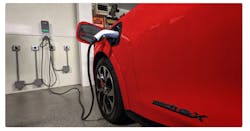Inflation Reduction Act Primed to Pump Billions into Renewables, EVs & Construction Markets
Mammoth in scope and vigorously debated on Capitol Hill, the recently passed Inflation Reduction Act (IRA) will directly impact the electrical wholesaling industry because of the billions of dollars in tax credits and other financial incentives it will pump into renewable power production and the industrial, construction and electric vehicle markets.
Federal tax credits will be available for electric utilities and other producers of renewable energy, building owners, homeowners and domestic manufacturers of equipment for the solar, wind, electric vehicles and EV battery markets when they make the investments specified in the bill. In the electrical construction market, virtually any company involved in the design, sale or installation of energy-efficient building products should see downstream revenues related to the construction of new manufacturing facilities, retrofits of commercial buildings, the installation of residential solar systems and other green project work.
While being an accountant, lawyer (or both) would help one understand the verbiage in the Inflation Reduction Act that President Biden signed into law on August 16 to combat climate change, reduce health costs and battle inflation, one thing is clear: it’s a big deal for electrical manufacturers, distributors, reps, electrical contractors and other buying influences. The bill aims to incentivize companies to onshore the manufacture of electric vehicles, batteries, solar panels and wind turbines. They will also benefit from the recently passed CHIPS and Science Act that will provide $52.7 billion in financial incentives for semiconductor manufacturers that build or expand factories in the United States.
Although many of IRA’s provisions don’t kick in for a year or two, the legislation’s extended tax credits and new financial incentives have been well-received by trade associations in the electrical, renewables and utility industries.
While the bill was being debated in Congress, Debra Phillips, president and CEO of the National Electrical Manufacturers Association (NEMA), wrote in a letter to Majority Leader Chuck Schumer and Nancy Pelosi, Speaker of the House that said in part, “NEMA members are already poised to invest billions to expand domestic manufacturing capabilities to facilitate the energy transition, and this legislation will make those investments a lasting reality.
“The Inflation Reduction Act includes over $360 billion in clean energy and climate provisions over the next 10 years, many of which are, and have been, supported by NEMA, including but not limited to:
• $500 million through the Defense Production Act to support the availability of strategic critical minerals and associated technology in the U.S.
• $30 billion in tax credits to accelerate growth of domestic manufacturing of renewable energy components
• $30 billion in targeted grant and loan programs for state and electric utilities to transition to clean electricity
• $10 billion in investment tax credits to build clean technology manufacturing facilities, including facilities that make electric vehicles, wind turbines and solar panels
• Over $9 billion for federal procurement of American-made clean technologies to create a stable market for clean products.
“Making the necessary investments to expand domestic clean energy manufacturing and achieving greenhouse gas emissions reduction goals requires certainty and the ability for companies to plan for the long-term. Given the current economic reality — characterized by continued disruption of pre-pandemic supply chains, inflation and dependence on international suppliers for critical components like semiconductors — NEMA urges Congress to work to expeditiously advance this legislation into law, which will help their downstream customers invest in and grow our nation’s domestic clean energy industrial base.”
Often an active lobbyist for energy bills on Capitol Hill, the National Electrical Contractors Association (NECA) said in a press release that it worked with Congressional leaders to ensure the IRA legislation “would make critical investments in clean energy opportunities for NECA contractors without an increased tax burden.”
“The National Electrical Contractors Association (NECA) applauds Congress on the passage of the Inflation Reduction Act of 2022,” NECA said in the release. “The Inflation Reduction Act, as negotiated by Senator Manchin and Majority Leader Schumer, will invest over $369 billion in domestic energy production and manufacturing. The investment will provide NECA contractors with new opportunities to modernize our energy portfolio and create good-paying jobs across America. In addition, this legislation has strong labor protections, including mandating prevailing wage rates and using apprentices from only registered apprenticeship programs.”
David Long, NECA CEO, said in the release, “NECA contractors are ready to go to work with their partners to build America’s new clean energy sector. I would like to commend Senator Manchin, Senator Sinema and members of Congress for their due diligence in negotiating a bill to make significant investments in America's domestic energy while not increasing taxes on our contractors."
Following are several key elements of the IRA that Electrical Marketing's editors believe will have the most direct impact on the electrical market.
Extension of the Investment Tax Credit (ITC) and Production Tax Credit (PTC)
The legislation offers extended and new tax incentives for electric utilities and other companies that build wind farms, centralized solar facilities and stand-alone energy storage facilities.
A post at www.natlawreview.com said, “The IRA comes as welcome news to the renewable energy industry as important tax incentives for wind, solar and other renewable energy resources are set to expire or wind down. Existing law also did not provide any federal tax incentives for the rapidly growing stand-alone energy storage and clean hydrogen industries. The IRA fixes that and more.”
Increase and expansion of the tax deduction for the construction and retrofit of energy-efficient buildings
A post at www.accountingtoday.com said, “The already permanent Section 179D tax deduction has been significantly increased from the current maximum of $1.88 per sq. ft. in 2022 to $5 per sq. ft. to reward the construction of energy-efficient commercial buildings, including multi-family buildings that are four stories or taller. Energy-efficient ground-up construction, along with energy efficient retrofits of older buildings, will be eligible.” The bill also included details on how lighting retrofits could qualify for these tax deductions.
Tax credits for the purchase of certain new and used electric vehicles
While the IRA includes some stipulations about which EVs are covered and has eligibility limitations for consumers in the highest tax bracket, new EVs assembled in North America that are on the IRA’s qualifying list will be eligible for a $7,500 tax credit starting in 2023. IRA’s tax credits for used EVs are $4,000.
Tax credit for electric-vehicle charging installations
According to an analysis of the Inflation Reduction Act by BriteSwitch, the 30C Tax Credit has been extended until Dec. 31, 2032. “Businesses and other organizations that install EV chargers at their facilities can qualify for an incentive of up to 30% of the cost,” said a post at www.briteswitch.com. “With the passage of the IRA, the maximum amount of the tax credit has increased from $30,000 to $100,000 for projects completed after Dec. 31, 2022. Projects completed before then would still be subject to the $30,000 cap.”
BriteSwitch also said homeowners can qualify for an EV charging system tax credit and can expense 30% of the project installation cost up to $1,000, as long as qualifying equipment is installed that allows bi-directional charging.
Residential Clean Energy Credit
Homeowners will be able to take 30% of the cost of installing a solar power systems off of their federal taxes through 2032, according to a post at www.kiplinger.com. Heather Zichal, CEO of the American Clean Power Association, said the legislation would provide companies in the clean power industry with “unprecedented multi-year policy certainty for clean energy.”
“This is the vote heard around the world,” she said in a press statement. “It puts America on a path to creating 550,000 new clean energy jobs while reducing economy-wide emissions 40% by 2030. This is a generational opportunity for clean energy after years of uncertainty and delay.”


